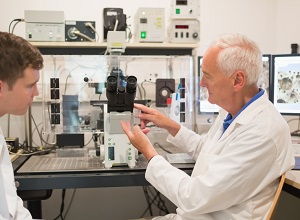Career - Cancer biology

Cancer may be defined as the abnormal uncontrolled proliferation of cells. Malignant cancers are those capable of invading adjacent tissues and spreading (metastasizing) to other parts of the body. For students interested in pursuing a career in cancer biology, an undergraduate study program including the following subjects is highly recommended: general biology, human anatomy & physiology, cell biology, biochemistry and molecular biology. Other highly useful subjects that may be taken as part of a Bachelor degree or incorporated as project skills obtained in a higher research degree (Honours, Masters or PhD) may include bioinformatics, genetics, histology, proteomics and stem cell biology.
Drug discovery, design and development is one of the largest fields in cancer research. Diagnosis and detection is one of the most rapidly growing fields with a strong focus on the identification of new tumour markers for early detection. For those interested in a career in drug discovery, design and development, or detection and diagnosis, it would be wise to include advanced biochemistry, chemistry, genetics and protein biology subjects within your study program.
Given the huge social impact of cancer (growing each year), a significant amount of funding is often devoted to cancer research. Hence, in most developed countries there is ample opportunity for those interested in high level cancer research (PhD qualified with experience) to obtain research grant funding, though competition is often intense. For those considering a PhD, projects in cancer biology can be undertaken from numerous angles depending on ones interest, including a vast array of cancer types such as blood, bone, brain, breast, lung, prostate, skin, etc, environmental causes of cancer such as exposure to air pollution or work related chemicals, heredity predisposition, DNA damage & repair, screening and more. Working in a cancer research laboratory usually involves all the general laboratory techniques applicable to most research laboratories including the significant use of cell culture models. Investigations may also involve the use of animal models in some circumstances. Besides research there is also opportunities in industry for those with suitable qualifications. Individuals with higher degrees (Honours, Masters, PhD) usually obtain high level positions in industry, often migrating to industry once skills and experience acquired in academia can be translated into commercial applications.
With the rapid growth in computing power we are seeing the increasing use of bioinformatic approaches to cancer research, such as the compilation of large patient versus control databases used to identify risk or protective genetic factors for disease development and progression. Those wishing to increase their competitiveness by gaining interdisciplinary qualifications may embark on study programs combining qualifications in biological science and computer science, enhancing ones career prospects in this rapidly advancing field.














